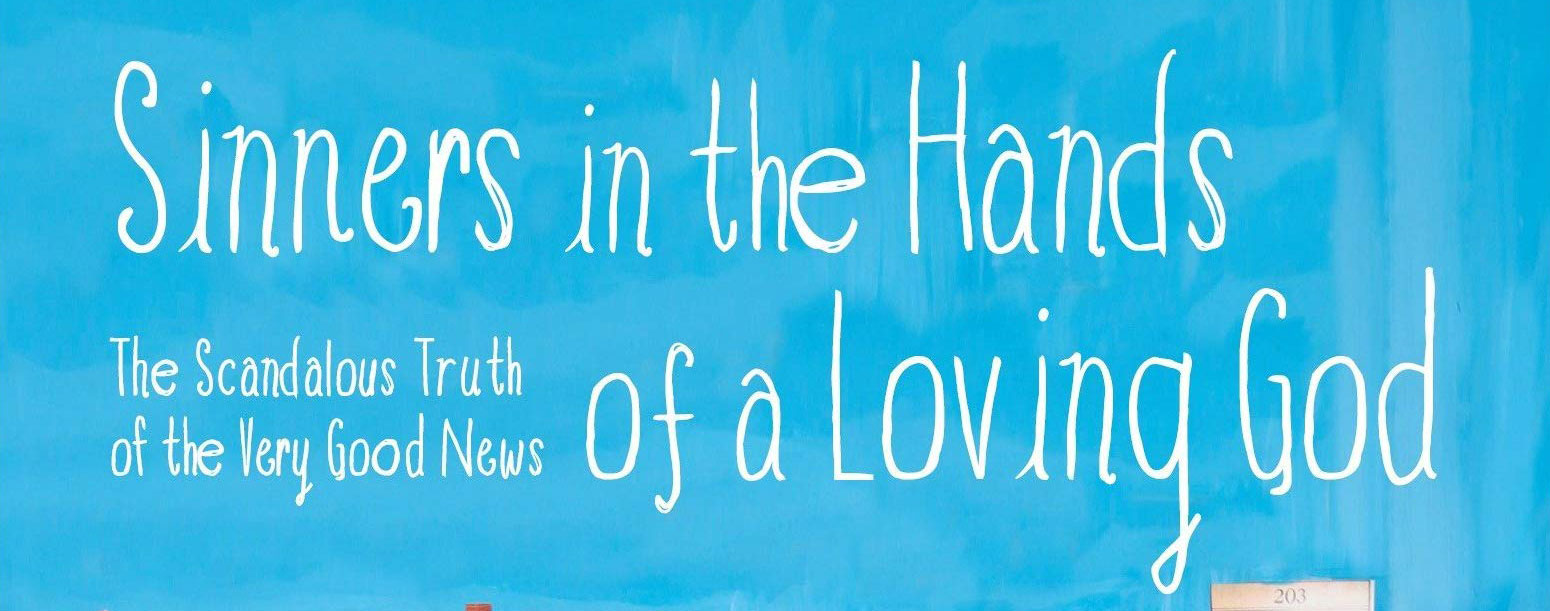Hoo boy…
This book (by Brian Zahnd) arrived in a padded envelope, the return address that of our beloved spiritual/marriage mentors.
People we love and trust sent us this book, so we better get started reading it.
Aaaand, before I even get to the book, context is important.
At the outset of the emerging church movement that started in the early aughts, I resonated with the idea that the Bible is actually much more difficult and complex in it’s message and meaning than most Christians were willing to admit. Just the genocide of the Isreali conquest into their “promised land” was enough for me to seriously question the motives of God – either a God who would demand those actions of his people, or a God who would allow his people to take those actions against his will, and call them his in written form.
Sinners in the Hands of a Loving God - Triptych completed during Covid 2020
Also, I’m a woman, and, well… If you’ve read the Old Testament, you know that can be a problem.
It was also during these years that our daughter realized she wasn’t attracted to men nearly as much as women. We have never been, and will never be, those Christians who shut out their own kids when they stop towing the prescribed theological line. We love our girl. Period.
In order to save my faith, my relationship with Jesus, I sort of set the OT aside, kept mostly to the Gospels, and read a lot of other books by people who knew more about how to translate meaning from the ancient Greek and Hebrew — bringing some potential new meaning into some traditionally stingy teachings, breathing life into my angry heart. Even still, my faith was pretty weak. Worship was spotty. It’s almost impossible to worship someone you don’t really trust. So, when Sinners arrived in the mail, well…
The book starts with the author, Brian Zahnd’s, personal story growing up in the Christian faith.
He admired the historic effectiveness of Jonathan Edwards’ famous sermon, “Sinners in the Hands of an Angry God”… effective for what Zahnd realized later in life was, “conversion by coercion”… scaring people into the Kingdom by threatening hellfire and damnation. He grew up terrified by the white-faced monster-God of Chick Tracts. The angry Father who demanded genocide of his people. The bad cop operating behind the good cop, Jesus.
Zahnd essentially makes the case that the Bible is written by a People who were discovering God incrementally, through history.
He argues that the Holy Scriptures are certainly inspired, but are covered in human fingerprints. And, that taken in historical context, the slow moves the Isrealites make over the centuries, eventually set them up to receive God’s final message – Himself. Immanuel. God with us. Zahnd sees the Bible not as the “Word of God”, but as the apparatus that points to the “Word of God”, who is Jesus. The Bible does this beautifully, showing the failure of the Law to correct human behavior, and the personal failings of the Bible’s faith “heroes”, who more often than not are people wracked with moral flaws, not to mention all the prophetic notes regarding the Messiah who would come.
One of my favorite chapters in the book recalls the story of The Transfiguration – when Jesus takes James, John, and Peter up on the mountainside so they can see him in all his glory. Elijah and Moses show up, and Peter, overwhelmed and perhaps a little flustered, asked if he should build three tents/tablernacles for the two historic religious leaders in addition to his friend, Jesus, who he recognizes as at least equal to them. God’s voice calls out,
“This is my Son, whom I love; with him I am well pleased. Listen to him!”
Listen to Jesus – his is the voice you should now pay attention to. The Law and Prophets (Moses and Elijah) point to Jesus, but they are not equal to Jesus. They are simply men. And, Jesus said, “If you’ve seen me, you have seen the Father.”
In the final four chapters of Sinners, Zahnd reframes the book of Revelation not as a futuristic prophecy, but as a political commentary of the Empire vs. Kingdom that John, the writer, was currently living in – writing to the churches he helped establish, giving advice on keeping their eyes on the prize of life with Jesus – not succumbing to the seductive trimmings of empire-living (being citizens of Rome), not allowing the comforts of being on top to distract from the sacrificial love God invited them into as they took up their own own crosses to follow their Friend. (There are lessons to learn here for modern-day empire-dwellers… hint, hint.)
The first time I read this book, I blew through it – taking in the pieces I could, surprised by fresh challenges at every turn. The second time, I started highlighting the really powerful bits. The third time, I added notations to the highlighted areas, because when you discover something that helps you find a path back to the God you love, you want to make sure you can communicate that something clearly — you want to be able to find your way back to the life-giving bread and wine, so you can share it.



